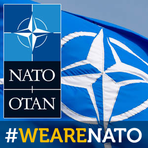The New Era of Warfare: Russia's Bold Missile Strike on Ukraine
November 22, 2024, 9:35 am

Location: United States, District of Columbia, Washington
Employees: 11-50
Founded date: 1971
The conflict between Russia and Ukraine has entered a perilous new chapter. On November 21, 2024, Russia launched a hypersonic intermediate-range ballistic missile at Dnipro, Ukraine. This marked a significant escalation in a war that has already raged for over 33 months. The missile, dubbed "Oreshnik," was fired from Astrakhan, over 700 kilometers away. It was a stark response to Ukraine's recent strikes into Russian territory using advanced Western weaponry.
This missile launch is not just a tactical maneuver; it is a message. Russian President Vladimir Putin’s televised address made it clear: more strikes could follow. The world watched as the night sky lit up with glowing projectiles, a grim reminder of the war's brutality. Ukraine's air force confirmed the missile's characteristics matched those of an intercontinental ballistic missile (ICBM). This was unprecedented. The use of such a weapon in an active conflict is a dangerous precedent.
The stakes have risen sharply. Ukraine's recent use of British Storm Shadow cruise missiles and U.S. ATACMS missiles to strike targets in Russia has pushed Moscow to respond with its most formidable arsenal. The Kremlin views these actions as a major escalation. The balance of power is shifting, and both sides are scrambling to assert dominance before potential peace talks.
Military experts are closely analyzing the implications of this missile launch. If confirmed, it would be the first military use of an ICBM in warfare. ICBMs are designed for long-range nuclear strikes, and their deployment in this context raises alarms. The missile's range of 3,000 to 5,500 kilometers means it can reach deep into enemy territory. However, there was no indication that the missile was nuclear-armed, which offers a sliver of hope amid rising tensions.
Ukraine's response has been swift. President Volodymyr Zelenskyy emphasized the need for international support against this new threat. The Ukrainian foreign ministry called for a robust reaction from the global community. The message is clear: Ukraine will not back down. It needs the capability to defend itself and to strike back at Russian rear bases that support the ongoing invasion.
The U.S. and NATO have remained largely silent in the immediate aftermath of the missile launch. The U.S. European Command stated it had no information on the reported use of an ICBM, deferring questions to the Department of Defense. This silence speaks volumes. It reflects the delicate balance of power and the fear of further escalation. The world is holding its breath, waiting to see how this situation unfolds.
Putin's recent actions, including lowering the threshold for a nuclear strike, add another layer of complexity. The Russian leader is sending a clear signal: any conventional attack could provoke a nuclear response. This is a dangerous game of brinkmanship. The potential for miscalculation is high, and the consequences could be catastrophic.
As the conflict intensifies, the geopolitical landscape is shifting. Former President Donald Trump has criticized the Biden administration's support for Ukraine, suggesting he would seek to end the war. His return to the White House could change the dynamics of the conflict. Both sides are positioning themselves for negotiations that have not occurred since the war's early days. They are trying to gain leverage before any potential talks.
The use of Western weapons by Ukraine has fundamentally altered the conflict. Moscow views these actions as a direct threat. The Kremlin's narrative is that Ukraine is being armed to strike at the heart of Russia. This perception fuels the fire of nationalism and justifies Russia's aggressive posture. The cycle of retaliation is vicious, and both sides are caught in a deadly dance.
The international community must pay attention. The situation in Ukraine is not just a regional conflict; it has global implications. The use of advanced weaponry raises the stakes for all nations. Allies must consider their responses carefully. The risk of escalation is real, and the consequences of inaction could be dire.
In conclusion, the missile strike on Dnipro is a wake-up call. It signifies a new phase in the Russia-Ukraine war, one marked by the potential for unprecedented destruction. As both sides prepare for what lies ahead, the world watches with bated breath. The balance of power is fragile, and the path to peace remains obscured by the smoke of war. The stakes have never been higher, and the consequences of miscalculation could be catastrophic. The time for decisive action is now.
This missile launch is not just a tactical maneuver; it is a message. Russian President Vladimir Putin’s televised address made it clear: more strikes could follow. The world watched as the night sky lit up with glowing projectiles, a grim reminder of the war's brutality. Ukraine's air force confirmed the missile's characteristics matched those of an intercontinental ballistic missile (ICBM). This was unprecedented. The use of such a weapon in an active conflict is a dangerous precedent.
The stakes have risen sharply. Ukraine's recent use of British Storm Shadow cruise missiles and U.S. ATACMS missiles to strike targets in Russia has pushed Moscow to respond with its most formidable arsenal. The Kremlin views these actions as a major escalation. The balance of power is shifting, and both sides are scrambling to assert dominance before potential peace talks.
Military experts are closely analyzing the implications of this missile launch. If confirmed, it would be the first military use of an ICBM in warfare. ICBMs are designed for long-range nuclear strikes, and their deployment in this context raises alarms. The missile's range of 3,000 to 5,500 kilometers means it can reach deep into enemy territory. However, there was no indication that the missile was nuclear-armed, which offers a sliver of hope amid rising tensions.
Ukraine's response has been swift. President Volodymyr Zelenskyy emphasized the need for international support against this new threat. The Ukrainian foreign ministry called for a robust reaction from the global community. The message is clear: Ukraine will not back down. It needs the capability to defend itself and to strike back at Russian rear bases that support the ongoing invasion.
The U.S. and NATO have remained largely silent in the immediate aftermath of the missile launch. The U.S. European Command stated it had no information on the reported use of an ICBM, deferring questions to the Department of Defense. This silence speaks volumes. It reflects the delicate balance of power and the fear of further escalation. The world is holding its breath, waiting to see how this situation unfolds.
Putin's recent actions, including lowering the threshold for a nuclear strike, add another layer of complexity. The Russian leader is sending a clear signal: any conventional attack could provoke a nuclear response. This is a dangerous game of brinkmanship. The potential for miscalculation is high, and the consequences could be catastrophic.
As the conflict intensifies, the geopolitical landscape is shifting. Former President Donald Trump has criticized the Biden administration's support for Ukraine, suggesting he would seek to end the war. His return to the White House could change the dynamics of the conflict. Both sides are positioning themselves for negotiations that have not occurred since the war's early days. They are trying to gain leverage before any potential talks.
The use of Western weapons by Ukraine has fundamentally altered the conflict. Moscow views these actions as a direct threat. The Kremlin's narrative is that Ukraine is being armed to strike at the heart of Russia. This perception fuels the fire of nationalism and justifies Russia's aggressive posture. The cycle of retaliation is vicious, and both sides are caught in a deadly dance.
The international community must pay attention. The situation in Ukraine is not just a regional conflict; it has global implications. The use of advanced weaponry raises the stakes for all nations. Allies must consider their responses carefully. The risk of escalation is real, and the consequences of inaction could be dire.
In conclusion, the missile strike on Dnipro is a wake-up call. It signifies a new phase in the Russia-Ukraine war, one marked by the potential for unprecedented destruction. As both sides prepare for what lies ahead, the world watches with bated breath. The balance of power is fragile, and the path to peace remains obscured by the smoke of war. The stakes have never been higher, and the consequences of miscalculation could be catastrophic. The time for decisive action is now.

